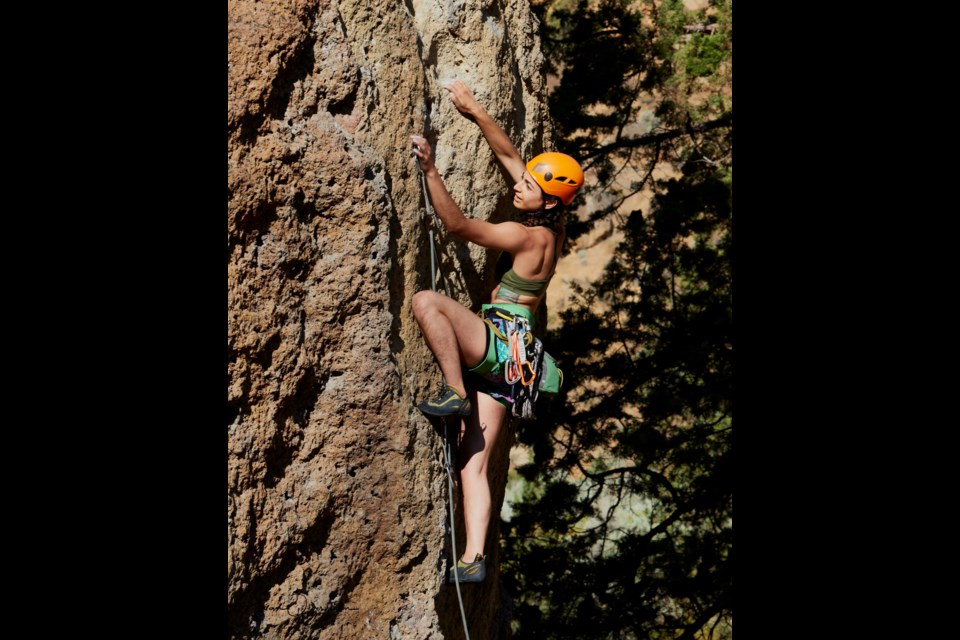As part of this year's Best of Climbing virtual showcase from the Vancouver International Mountain Film Festival, or VIMFF, there will be a second opportunity to watch Stanhope's instructional video, which debuted at last year's Arc'teryx Climbing Academy.
This year, VIMFF is encouraging people to donate to Belay All, a climbing collective that aims to remove barriers that prevent diverse groups from getting involved in climbing.An option to donate to the group is on the festival's site, and people can choose how much they want to give.
Stanhope said his course helps people starting out with leading and provides pointers for crack climbing — an especially common type of climbing in Squamish."It's kind of like an intro to lead climbing with a crack climbing component and lead strategies, so it's kind of a mixed bag," Stanhope told The Chief.
Stanhope noted that many people will be starting their projects this season, and he had a few words of advice."Protect early and often, play it safe and expose yourself to different crack sizes," he said.
Regarding VIMFF's effort to encourage diversity in climbing, Stanhope said the climbing community has generally been welcoming in his experience, but there's still room for improvement."I think that climbing's a pretty inclusive group, to be honest, and I think obviously there's work to be done. I think climbing, in general, is a bunch of misfits and outlaws. I've never seen anybody get a hard time because of the colour of their skin or their orientation," he said.
"I think there are barriers for some people. It would be great to break those things down, but I think climbers, on the whole, are a pretty damn inclusive group. "In recent years, there has been much discussion about increasing the diversity of climbing and outdoor sports, a traditionally white and male domain.
The New York Times noted in 2016 that according to the most recent data at the time, 22% of visitors to parks were minorities, though they make up some 37 percent of the population.Companies and advocacy groups have been weighing in on the matter.
For example, in 2018, MEC addressed the lack of diversity in outdoor brand advertising, and that same year, established a diversity and inclusion steering committee.The co-founder of Belay All said the group aims to remove barriers preventing diverse groups from enjoying the sport of climbing. Anyone is allowed to join, but effort is made to make sure the events and space are a positive environment for all groups, especially those that have traditionally experienced marginalization.
Anaheed Saatchi, who is trans and uses the pronoun they, said the goal is to create safe spaces.One of the ways the group has done this is through meetups, but there's also work being done to get people to work in the outdoors industry either in prominent brands or as teachers and coaches.
Saatchi said people who don't believe there are challenges regarding diversity in outdoor sports should educate themselves on the matter."There's decades and decades of scholarship and data and just facts that prove otherwise to the point that you can trace the pandemic and all of the disproportionate ways it's affecting different communities or the way you can sample demographic incomes — the data is there," they said.
Saatchi said people must work on themselves when it comes to tackling these issues.
"If someone is a white person, if someone is a cis-male person, they have work to do, and they have a role to play right now, and accepting that and working through all the fragility that comes through that is part of the process. And then that internal work doesn't end — you know, it applies to everything," they said.
Saatchi also had some thoughts on what the biggest obstacles are to diversity in the outdoor recreation industry.
"The biggest problem is that it's not obligated to community. So there isn't a system of checks. like people are just allowed to build unchecked and they're all in echo chambers that tell them what they're doing is OK, because all of the precedents are also part of the same problematic industry so when voices chime in, change comes about so slowly that the distribution of labour — all that stuff is so uneven, unequal. It's demanding of people who end just up being whistle blowers or targeted as disruptive or annoying," they said.
"Disorienting is the least of it. It's dehumanizing to do that to people, so the biggest obstacle is that we don't put people first. We put products and profit first."Organizations can address this by creating timelines for obligations like increasing Black leadership, sustainability, Indigenous sovereignty, education, and more, Saatchi said.
Go to VIMFF for the Best of Climbing online showcase.



